For the 2025 school year, there are 2 public elementary schools serving 470 students in Fayette R-III School District. This district's average elementary testing ranking is 3/10, which is in the bottom 50% of public elementary schools in Missouri.
Public Elementary Schools in Fayette R-III School District have an average math proficiency score of 25% (versus the Missouri public elementary school average of 40%), and reading proficiency score of 35% (versus the 42% statewide average).
Minority enrollment is 13% of the student body (majority Black), which is less than the Missouri public elementary school average of 32% (majority Black).
Overview
This School District
This State (MO)
# Schools
3 Schools
1,747 Schools
# Students
671 Students
575,116 Students
# Teachers
55 Teachers
46,819 Teachers
Student : Teacher Ratio
12:1
12:1
District Rank
Fayette R-III School District, which is ranked within the bottom 50% of all 553 school districts in Missouri (based off of combined math and reading proficiency testing data) for the 2021-2022 school year.
The school district's graduation rate of 90% has increased from 80-89% over five school years.
Overall District Rank
#388 out of 557 school districts
(Bottom 50%)
(Bottom 50%)
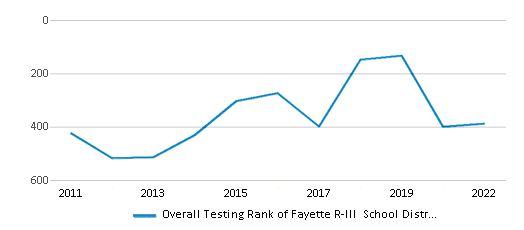
Math Test Scores (% Proficient)
27%
39%
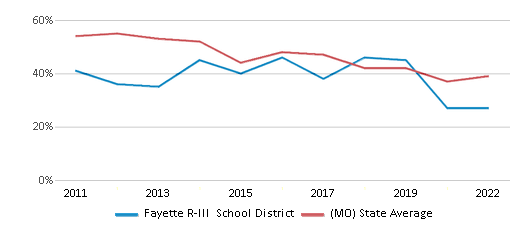
Reading/Language Arts Test Scores (% Proficient)
37%
43%
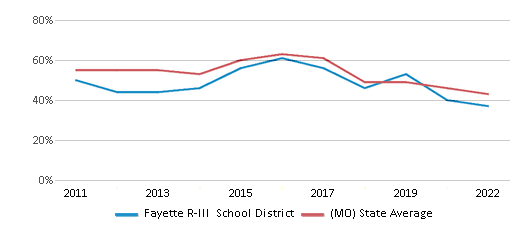
Science Test Scores (% Proficient)
30-34%
38%
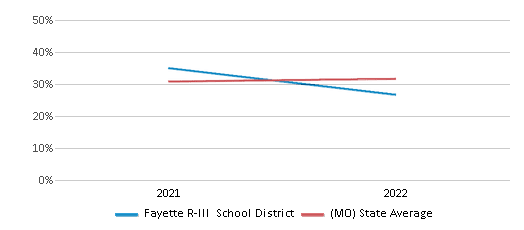
Graduation Rate
≥90%
90%
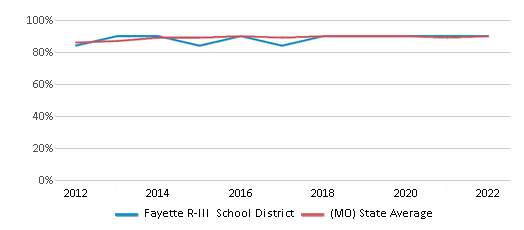
Students by Ethnicity:
Diversity Score
0.25
0.51
# American Indian Students
2 Students
2,038 Students
% American Indian Students
1%
n/a
# Asian Students
1 Student
12,320 Students
% Asian Students
n/a
2%
# Hispanic Students
15 Students
47,223 Students
% Hispanic Students
2%
8%
# Black Students
34 Students
89,252 Students
% Black Students
5%
16%
# White Students
579 Students
389,099 Students
% White Students
86%
68%
# Hawaiian Students
1 Student
2,412 Students
% Hawaiian Students
n/a
n/a
# Two or more races Students
39 Students
32,772 Students
% of Two or more races Students
6%
6%
Students by Grade:
# Students in PK Grade:
39
19,285
# Students in K Grade:
49
59,679
# Students in 1st Grade:
36
62,780
# Students in 2nd Grade:
42
65,110
# Students in 3rd Grade:
53
63,746
# Students in 4th Grade:
53
64,813
# Students in 5th Grade:
48
64,811
# Students in 6th Grade:
55
65,222
# Students in 7th Grade:
55
48,663
# Students in 8th Grade:
40
48,580
# Students in 9th Grade:
51
3,086
# Students in 10th Grade:
53
3,116
# Students in 11th Grade:
51
3,104
# Students in 12th Grade:
46
3,121
# Ungraded Students:
-
-
District Revenue and Spending
The revenue/student of $12,051 in this school district is less than the state median of $15,081. The school district revenue/student has stayed relatively flat over four school years.
The school district's spending/student of $9,255 is less than the state median of $13,908. The school district spending/student has stayed relatively flat over four school years.
Total Revenue
$8 MM
$13,447 MM
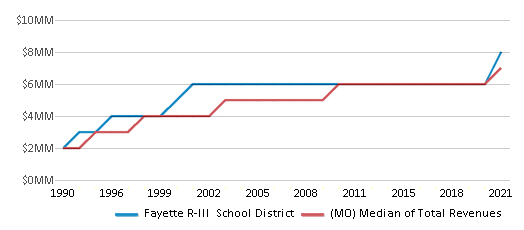
Spending
$6 MM
$12,401 MM
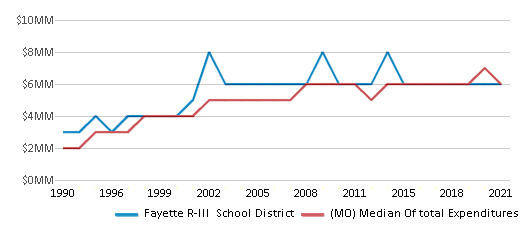
Revenue / Student
$12,051
$15,081
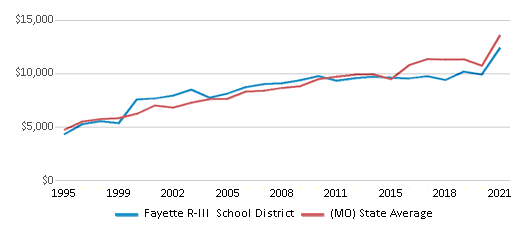
Spending / Student
$9,255
$13,908
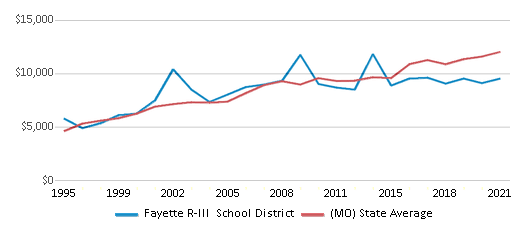
Best Fayette R-III School District Public Elementary Schools (2025)
School
(Math and Reading Proficiency)
(Math and Reading Proficiency)
Location
Grades
Students
Rank: #11.
Laurence J. Daly Elementary School
(Math: 25-29% | Reading: 35-39%)
Rank:
Rank:
4/
Bottom 50%10
702 Lucky St
Fayette, MO 65248
(660) 248-3800
Fayette, MO 65248
(660) 248-3800
Grades: PK-5
| 320 students
Rank: #22.
Wm. N. Clark Middle School
(Math: 20-24% | Reading: 30-34%)
Rank:
Rank:
3/
Bottom 50%10
704 Lucky St
Fayette, MO 65248
(660) 248-3800
Fayette, MO 65248
(660) 248-3800
Grades: 6-8
| 150 students
Recent Articles

Sexual Harassment at Age 6: The Tale of a First Grade Suspension
A six-year old in Aurora, Colorado, was suspended after singing an LMFAO song to a little girl in his class and reportedly 鈥渟haking his booty.鈥� We look at the case and the sexual harassment problem in public schools today.

How Scaffolding Could Change the Way Your Child Learns
This article explores the concept of instructional scaffolding, a teaching method that enhances learning by breaking down complex tasks into manageable parts. It highlights how scaffolding supports students in developing critical thinking skills and becoming more independent learners. The article discusses the benefits of scaffolding, including improved engagement and reduced anxiety, and provides strategies for its implementation across various educational levels.

February 05, 2025
Understanding the U.S. Department of Education: Structure, Impact, and EvolutionWe explore how the Department of Education shapes American education, from its cabinet-level leadership to its impact on millions of students, written for general audiences seeking clarity on this vital institution.





